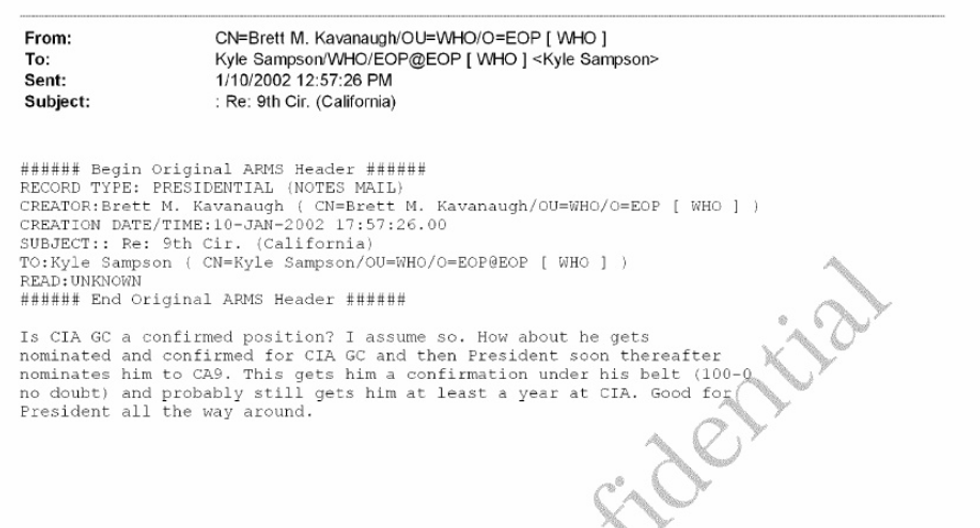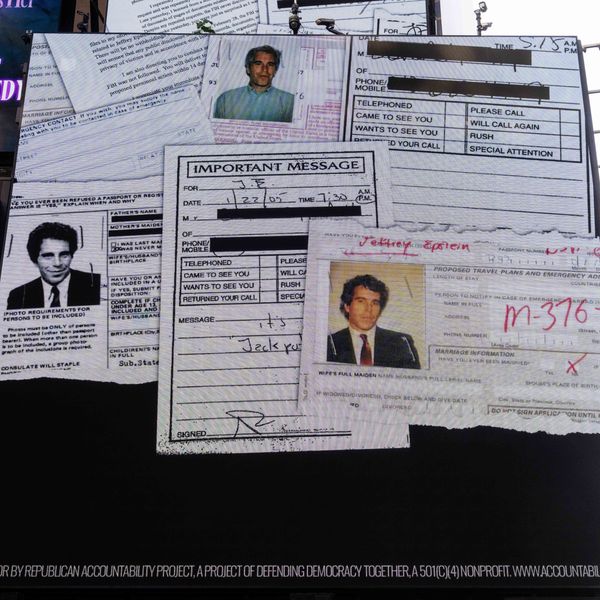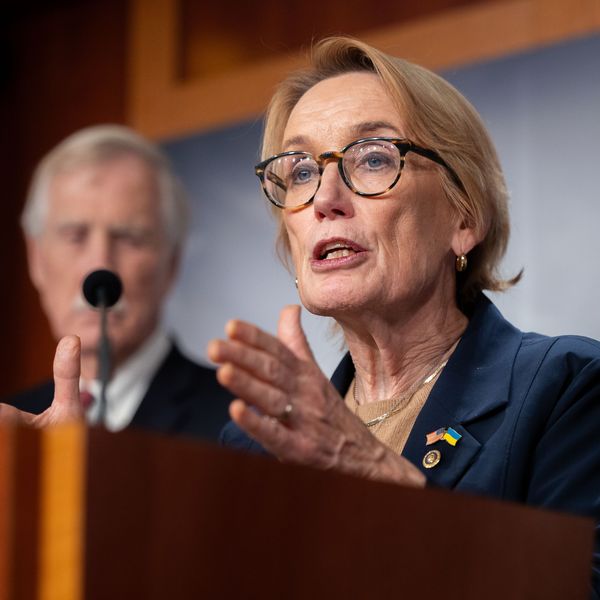
Newly released emails show that Judge Brett Kavanaugh pushed to make John Yoo, the author of the Bush administration's torture memos, a federal judge. (Photo: The Commonwealth Club/Flickr/cc)
Email Marked 'Confidential' by GOP Shows Kavanaugh Pushed for John Yoo, Legal Architect of Bush Torture Program, to Be a Federal Judge
Trump nominee for U.S. Supreme Court believed author of notorious memos providing legal cover for those torturing human beings would be great as lifetime pick for Ninth Circuit
Included in the Judge Brett Kavanaugh-related documents the Senate Judiciary Committee strived to keep hidden from the public this week by marking them "committee confidential" are a series of emails in which the U.S. Supreme Court nominee pushed to make one of the country's biggest proponents of torture a federal judge.
Emails released by Sen. Cory Booker (D-N.J.) in defiance of the committee's Republicans showed Kavanaugh calling John Yoo, the lawyer who authored many of the George W. Bush administration's torture memos, his "magic bullet" and his choice for a vacant seat on the Ninth Circuit Court of Appeals.
Kavanaugh first sent an email saying he wanted Yoo on the appeals court in November 2001. Upon learning that the attorney was more interested in a job as the CIA's general counsel, Kavanaugh suggested he work in that position for a year before serving as a judge.


The conversations regarding Yoo's future representing the CIA in legal matters and judging cases in the nation's largest appeals court were taking place as he was authoring the torture memos.
The memos flew in the face of the United Nations' Convention Against Torture and served as United States' justification for illegally ignoring the conventions as it tortured detainees at Guantanamo Bay and other prisons.
As Ian Millhiser notes at ThinkProgress, "Yoo's torture memos are widely viewed as one of the worst examples of legal malpractice in American history."
The memos claimed that the conventions did not apply to detainees held by the U.S. in the war in Afghanistan. One key memo written by Yoo claimed that a detainee should not be considered to be suffering "severe pain" during torture unless the pain was equivalent to the kind "that would be associated with serious physical injury so severe that death, organ failure, or permanent damage resulting in a loss of significant bodily function would likely result."
Historian Andy Worthington wrote at Common Dreams earlier this year about the memos' enduring impact on Americans' views about torture:
As Donald Trump took office, 48 percent of Americans said that "there are some circumstances under which the use of torture is acceptable in U.S. anti-terrorism efforts." Encouragingly, 49 percent disagreed, but it remains, I believe, a sign of the enduring power of the Bush administration's bellicose pro-torture maneuverings in the wake of the 9/11 attacks that torture remains so popular, just as, with Guantanamo, the dark propaganda of the prison's early days--as a place which, allegedly held "the worst of the worst"-- has proven alarmingly durable, despite relentless efforts by campaigners, myself included, to demonstrate its almost complete groundlessness.
Yoo has returned the favor to Kavanaugh recently, pushing for his confirmation in an editorial for Fox News and an interview with the San Francisco Chronicle.
The emails showing Kavanaugh's support of Yoo surfaced shortly after Democrats argued that he also supported the use of torture during his time in the Bush administration.
\u201cJudge Kavanaugh appears to have participated in a dark chapter of our nation\u2019s history during the Bush Admin\u2019s use of torture and cruel, inhumane treatment of prisoners \u2013 and he misled the Senate about it when he testified UNDER OATH in 2006.\u201d— Tammy Duckworth (@Tammy Duckworth) 1535655463
An Urgent Message From Our Co-Founder
Dear Common Dreams reader, The U.S. is on a fast track to authoritarianism like nothing I've ever seen. Meanwhile, corporate news outlets are utterly capitulating to Trump, twisting their coverage to avoid drawing his ire while lining up to stuff cash in his pockets. That's why I believe that Common Dreams is doing the best and most consequential reporting that we've ever done. Our small but mighty team is a progressive reporting powerhouse, covering the news every day that the corporate media never will. Our mission has always been simple: To inform. To inspire. And to ignite change for the common good. Now here's the key piece that I want all our readers to understand: None of this would be possible without your financial support. That's not just some fundraising cliche. It's the absolute and literal truth. We don't accept corporate advertising and never will. We don't have a paywall because we don't think people should be blocked from critical news based on their ability to pay. Everything we do is funded by the donations of readers like you. Will you donate now to help power the nonprofit, independent reporting of Common Dreams? Thank you for being a vital member of our community. Together, we can keep independent journalism alive when it’s needed most. - Craig Brown, Co-founder |
Included in the Judge Brett Kavanaugh-related documents the Senate Judiciary Committee strived to keep hidden from the public this week by marking them "committee confidential" are a series of emails in which the U.S. Supreme Court nominee pushed to make one of the country's biggest proponents of torture a federal judge.
Emails released by Sen. Cory Booker (D-N.J.) in defiance of the committee's Republicans showed Kavanaugh calling John Yoo, the lawyer who authored many of the George W. Bush administration's torture memos, his "magic bullet" and his choice for a vacant seat on the Ninth Circuit Court of Appeals.
Kavanaugh first sent an email saying he wanted Yoo on the appeals court in November 2001. Upon learning that the attorney was more interested in a job as the CIA's general counsel, Kavanaugh suggested he work in that position for a year before serving as a judge.


The conversations regarding Yoo's future representing the CIA in legal matters and judging cases in the nation's largest appeals court were taking place as he was authoring the torture memos.
The memos flew in the face of the United Nations' Convention Against Torture and served as United States' justification for illegally ignoring the conventions as it tortured detainees at Guantanamo Bay and other prisons.
As Ian Millhiser notes at ThinkProgress, "Yoo's torture memos are widely viewed as one of the worst examples of legal malpractice in American history."
The memos claimed that the conventions did not apply to detainees held by the U.S. in the war in Afghanistan. One key memo written by Yoo claimed that a detainee should not be considered to be suffering "severe pain" during torture unless the pain was equivalent to the kind "that would be associated with serious physical injury so severe that death, organ failure, or permanent damage resulting in a loss of significant bodily function would likely result."
Historian Andy Worthington wrote at Common Dreams earlier this year about the memos' enduring impact on Americans' views about torture:
As Donald Trump took office, 48 percent of Americans said that "there are some circumstances under which the use of torture is acceptable in U.S. anti-terrorism efforts." Encouragingly, 49 percent disagreed, but it remains, I believe, a sign of the enduring power of the Bush administration's bellicose pro-torture maneuverings in the wake of the 9/11 attacks that torture remains so popular, just as, with Guantanamo, the dark propaganda of the prison's early days--as a place which, allegedly held "the worst of the worst"-- has proven alarmingly durable, despite relentless efforts by campaigners, myself included, to demonstrate its almost complete groundlessness.
Yoo has returned the favor to Kavanaugh recently, pushing for his confirmation in an editorial for Fox News and an interview with the San Francisco Chronicle.
The emails showing Kavanaugh's support of Yoo surfaced shortly after Democrats argued that he also supported the use of torture during his time in the Bush administration.
\u201cJudge Kavanaugh appears to have participated in a dark chapter of our nation\u2019s history during the Bush Admin\u2019s use of torture and cruel, inhumane treatment of prisoners \u2013 and he misled the Senate about it when he testified UNDER OATH in 2006.\u201d— Tammy Duckworth (@Tammy Duckworth) 1535655463
Included in the Judge Brett Kavanaugh-related documents the Senate Judiciary Committee strived to keep hidden from the public this week by marking them "committee confidential" are a series of emails in which the U.S. Supreme Court nominee pushed to make one of the country's biggest proponents of torture a federal judge.
Emails released by Sen. Cory Booker (D-N.J.) in defiance of the committee's Republicans showed Kavanaugh calling John Yoo, the lawyer who authored many of the George W. Bush administration's torture memos, his "magic bullet" and his choice for a vacant seat on the Ninth Circuit Court of Appeals.
Kavanaugh first sent an email saying he wanted Yoo on the appeals court in November 2001. Upon learning that the attorney was more interested in a job as the CIA's general counsel, Kavanaugh suggested he work in that position for a year before serving as a judge.


The conversations regarding Yoo's future representing the CIA in legal matters and judging cases in the nation's largest appeals court were taking place as he was authoring the torture memos.
The memos flew in the face of the United Nations' Convention Against Torture and served as United States' justification for illegally ignoring the conventions as it tortured detainees at Guantanamo Bay and other prisons.
As Ian Millhiser notes at ThinkProgress, "Yoo's torture memos are widely viewed as one of the worst examples of legal malpractice in American history."
The memos claimed that the conventions did not apply to detainees held by the U.S. in the war in Afghanistan. One key memo written by Yoo claimed that a detainee should not be considered to be suffering "severe pain" during torture unless the pain was equivalent to the kind "that would be associated with serious physical injury so severe that death, organ failure, or permanent damage resulting in a loss of significant bodily function would likely result."
Historian Andy Worthington wrote at Common Dreams earlier this year about the memos' enduring impact on Americans' views about torture:
As Donald Trump took office, 48 percent of Americans said that "there are some circumstances under which the use of torture is acceptable in U.S. anti-terrorism efforts." Encouragingly, 49 percent disagreed, but it remains, I believe, a sign of the enduring power of the Bush administration's bellicose pro-torture maneuverings in the wake of the 9/11 attacks that torture remains so popular, just as, with Guantanamo, the dark propaganda of the prison's early days--as a place which, allegedly held "the worst of the worst"-- has proven alarmingly durable, despite relentless efforts by campaigners, myself included, to demonstrate its almost complete groundlessness.
Yoo has returned the favor to Kavanaugh recently, pushing for his confirmation in an editorial for Fox News and an interview with the San Francisco Chronicle.
The emails showing Kavanaugh's support of Yoo surfaced shortly after Democrats argued that he also supported the use of torture during his time in the Bush administration.
\u201cJudge Kavanaugh appears to have participated in a dark chapter of our nation\u2019s history during the Bush Admin\u2019s use of torture and cruel, inhumane treatment of prisoners \u2013 and he misled the Senate about it when he testified UNDER OATH in 2006.\u201d— Tammy Duckworth (@Tammy Duckworth) 1535655463

